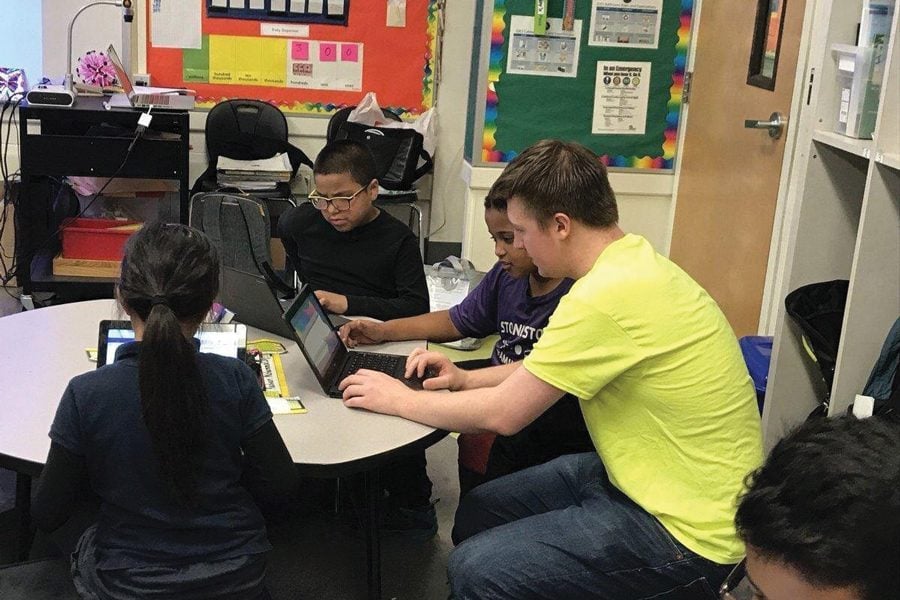Two Northwestern startups chosen as semi-finalists in startup competition
McCormick junior and Codemoji co-founder Livio Bolzon helps a student with a Codemoji lesson in a San Francisco school. Codemoji and HotPlate, two student-owned Northwestern startups, were chosen as semi-finalists in a national startup competition.
January 21, 2018
Two student-owned Northwestern startups are semifinalists in Student Startup Madness, a nationwide college startup competition focusing on digital media.
Codemoji and HotPlate are among the 32 semifinalists announced in a Jan. 16 news release. The platform Codemoji uses emojis to get middle and elementary school students interested in programming, and the mobile app HotPlate introduces diners to the best dishes at a restaurant.
Student Startup Madness founder Sean Branagan said eight finalists will be selected from the semifinalists and have the opportunity to pitch at South by Southwest — an annual gathering featuring festivals and conferences focusing on interactive media, film and music.
“(The competition) gives you the ability to do high-end networking with people who are in that startup and tech world,” Branagan told The Daily.
He added that many startups have launched at South by Southwest, including Twitter. Student Startup Madness looks at four metrics: strength of idea, strength of team, market size and market traction, Branagan said.
“In the case of (Codemoji and HotPlate), you can see they’re very different,” Branagan said. “That’s the beauty of what we see as the power of innovation and entrepreneurship on campuses across the country.”
Codemoji co-founder Livio Bolzon said Codemoji uses an image-based approach to learning. A child is more likely to remember the word “cat” if there’s a picture included with the word, the School of Professional Studies student said, adding they chose emojis related to the code they were teaching — like a camera emoji representing an image tag in programming code.
Still, Bolzon said, emojis only constitute a small part — about 10 to 15 percent — of Codemoji’s learning content. The rest of the curriculum is based on text-based learning but still geared towards children, he added.
“(Emojis are) a good way to get kids acclimated initially,” Bolzon said. “It becomes difficult to teach them some more complex concepts at some point.”
The company’s platform has been used by over 150,000 children since it started in late 2016, Bolzon said, and includes countries from around the world.
“We want to just keep growing and helping more kids every day,” Bolzon said.
HotPlate CEO Sarah Ahmad said that company’s app has over 300 users and currently focuses on Evanston restaurants, though the company plans to expand into other locations.
The McCormick senior said she came up with the idea for HotPlate during a summer internship in the greater Chicago area, and continued to build on the idea through a class project at NU.
“It was really surprising to me that there wasn’t really a website that you could go to, to really get that dish-level information,” Ahmad said. “If you’re going in (a restaurant), this might be your only time.”
Users can search for a specific dish on the app and get restaurant recommendations, or go to a restaurant and see what the best dishes are. Then, users can leave ratings after eating at the restaurant. Ahmad said this focus on individual dishes differentiates HotPlate from sites like Yelp.
Ahmad said she came across Student Startup Madness while searching for pitch competitions, and thought it would be an “awesome” opportunity to pitch at South by Southwest.
“As a student startup, you should take as many opportunities as you can get,” Ahmad said. “It’s really about (the) exposure and getting in touch with these people that will later on hopefully invest in your company.”
Email: alane.lim@u.northwestern.edu
Twitter: @thisisalane



